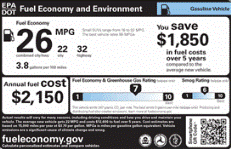
Hydrogen (H2) is being aggressively explored as a fuel for passenger vehicles. It can be used in fuel cells to power electric motors or burned in internal combustion engines (ICEs).
It is an environmentally friendly fuel that has the potential to dramatically reduce our dependence on imported oil, but several significant challenges must be overcome before it can be widely used.
Benefits
Produced Domestically. Hydrogen can be produced domestically from several sources, reducing our dependence on petroleum imports.
Environmentally Friendly. Hydrogen produces no air pollutants or greenhouse gases when used in fuel cells; it produces only nitrogen oxides (NOx) when burned in ICEs.
Challenges

Fuel Cost & Availability. Hydrogen is currently expensive to produce and is only available at a handful of locations, mostly in California.
Vehicle Cost & Availability. Fuel cell vehicles are currently far too expensive for most consumers to afford, and they are only available to a few demonstration fleets.
Onboard Fuel Storage. Hydrogen contains much less energy than gasoline or diesel on a per-volume basis, making it difficult for hydrogen vehicles to go as far as gasoline vehicles between fillups—about 300 miles. Technology is improving, but the onboard hydrogen storage systems do not yet meet size, weight, and cost goals for commercialization.
Other challenges include fuel cell performance, customer acceptance, and hydrogen transport and bulk storage.
Additional Information
Alternative Fuels and Advanced Vehicles Data Center










